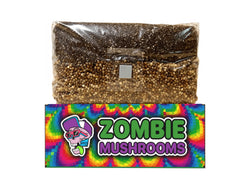- Regular consumption of unsweetened coffee is linked to a 29-30% lower risk of Alzheimer’s and Parkinson’s disease.
- Adding sugar or artificial sweeteners eliminates coffee’s protective effects against neurodegenerative diseases.
- Both caffeinated and decaffeinated coffee provide brain benefits—but only if consumed unsweetened.
- Functional mushrooms, like Lion’s Mane, may enhance cognitive function and work synergistically with coffee.
- Lifestyle changes, including proper sleep, exercise, and diet, can further reduce neurodegenerative risk.
Most people drink coffee to boost energy, but growing research suggests that unsweetened coffee may also protect against Alzheimer’s disease and Parkinson’s disease. A large-scale study from the UK Biobank found that regular coffee drinkers who avoided sweeteners had a significantly lower risk of developing these neurodegenerative diseases—even reducing their chances of dying from them by 43% (Zhang et al., 2024). Let’s explore how unsweetened coffee affects brain health and why avoiding sugar or artificial sweeteners makes a difference.

Understanding Alzheimer’s and Parkinson’s Diseases
Neurodegenerative diseases affect millions worldwide, gradually impairing memory, movement, and cognitive function. Understanding their root causes can shed light on how diet, including unsweetened coffee, plays a protective role.
What Is Alzheimer’s Disease?
Alzheimer’s disease is the most common form of dementia, accounting for 60-80% of dementia cases. It is a progressive brain disorder that deteriorates cognitive function and memory due to the accumulation of amyloid plaques and tau tangles, which damage neurons and disrupt communication.
Key Risk Factors for Alzheimer’s Disease:
- Aging
- Genetics (APOE-e4 gene)
- Chronic inflammation and oxidative stress
- Poor cardiovascular health
- Insulin resistance (linked to Type 2 diabetes)
What Is Parkinson’s Disease?
Parkinson’s disease primarily affects movement through the progressive loss of dopamine-producing neurons in the brain. Symptoms include tremors, slow movement, muscle stiffness, and balance issues. As the disease progresses, cognitive problems and mood disorders often develop.
Key Risk Factors for Parkinson’s Disease:
- Genetics (mutations like LRRK2, PINK1)
- Exposure to toxins (pesticides, heavy metals)
- Chronic neuroinflammation
- Gut health imbalances (connection to the gut-brain axis)

New Study: Unsweetened Coffee’s Role in Lowering Neurodegenerative Risk
The UK Biobank study involving 204,847 participants examined coffee habits and their association with Alzheimer’s and Parkinson’s risks. The findings were compelling:
- Regular unsweetened coffee drinkers had a 29-30% lower risk of developing Alzheimer's and Parkinson’s.
- Their risk of dying from these diseases was 43% lower than non-coffee drinkers.
- Decaf coffee also showed a 34-37% lower risk—as long as it was unsweetened.
- Sugary or artificially sweetened coffee provided no protection and may even add to neurodegenerative risks.
Key takeaway: It’s the naturally occurring compounds in coffee—not sugar, syrups, or other additives—that appear to protect the brain.

Why Does Unsweetened Coffee Protect the Brain?
The neuroprotective effects of coffee come from its rich composition of natural compounds.
Caffeine: A Brain-Stimulating Molecule
Caffeine is a well-known stimulant that improves alertness and focus, but it also plays a neuroprotective role:
- Blocks adenosine, a neurotransmitter that promotes sleep and drowsiness.
- Enhances dopamine production, reducing Parkinson’s risk.
- May reduce beta-amyloid deposits, a hallmark of Alzheimer’s disease.
Antioxidants: Fighting Free Radicals
Coffee is rich in polyphenols and flavonoids, which counter oxidative stress—a key contributor to neurodegeneration. These compounds:
- Prevent neuron damage by neutralizing harmful free radicals.
- Reduce neuroinflammation, which is linked to both Alzheimer’s and Parkinson’s.
- Support mitochondrial function, enhancing brain cell energy production.
Boosting Brain Plasticity
Substances in coffee stimulate brain-derived neurotrophic factor (BDNF), a protein crucial for nerve growth and repair. Higher BDNF levels are associated with lower rates of cognitive decline.
Conclusion: The combination of caffeine, antioxidants, and BDNF stimulation helps shield the brain against degenerative changes.

The Harmful Effects of Sugar and Artificial Sweeteners
Many people drink coffee with sugar or artificial sweeteners, not realizing these additives might negate coffee’s health benefits.
Excess Sugar Increases Your Risk of Cognitive Decline
Consuming too much sugar can:
- Increase insulin resistance, affecting brain function.
- Promote chronic inflammation, which accelerates neuron damage.
- Contribute to the development of type 3 diabetes, a term coined for Alzheimer’s.
Artificial Sweeteners Disrupt the Gut-Brain Connection
Recent studies suggest that artificial sweeteners can:
- Alter the gut microbiome, which plays a crucial role in brain health.
- Potentially increase neuroinflammation and cognitive impairment.
Solution: The best way to maximize coffee’s neuroprotective effects is to drink it black or with unsweetened plant-based alternatives.

Decaf vs. Regular Coffee: Does It Still Work?
The UK Biobank study found that decaffeinated coffee also showed neuroprotective effects, provided it was unsweetened.
- Those consuming unsweetened decaf coffee had a 34–37% lower risk of Alzheimer’s and Parkinson’s.
- Their mortality risk was 47% lower compared to non-coffee drinkers.
This means that even without caffeine, coffee’s antioxidants and other brain-supporting compounds provide protective benefits.

Functional Mushrooms: A Complement to Coffee for Brain Health
In addition to drinking unsweetened coffee, supplementing with functional mushrooms can further support cognitive function.
Lion’s Mane Mushroom: A Natural Brain Booster
- Stimulates nerve growth factor (NGF), promoting neuron repair.
- Supports memory and focus, making it a popular nootropic.
- May help delay cognitive decline in early Alzheimer’s stages.
Reishi Mushroom: Anti-Inflammatory and Stress-Reducing
- Contains triterpenes that combat neuroinflammation.
- Helps regulate stress hormones, reducing cognitive decline linked to stress.
How Mushroom Coffee Works
Combining functional mushrooms with coffee may create synergistic benefits, enhancing cognitive function while supporting long-term brain health. Brands like Zombie Mushrooms offer high-quality supplements that can be easily included in a daily coffee routine.

Lifestyle Changes to Further Lower Alzheimer’s and Parkinson’s Risk
While coffee and functional mushrooms offer benefits, other healthy habits play a critical role in brain health:
- Exercise Regularly: Physical activity boosts brain blood flow and neurogenesis.
- Follow a Brain-Healthy Diet: The Mediterranean diet (rich in healthy fats and antioxidants) is linked to lower dementia risk.
- Prioritize Sleep: Quality sleep helps the brain clear away toxins and repair neurons.
- Manage Stress: Chronic stress increases cortisol, which can shrink the hippocampus (memory center).
Key Takeaways: Coffee and Brain Health Go Hand in Hand
The latest research suggests that drinking unsweetened coffee can reduce the risk of Alzheimer’s and Parkinson’s disease. It provides neuroprotective benefits through caffeine, antioxidants, and brain plasticity support. However, adding sugar or artificial sweeteners cancels these effects.
For an even greater cognitive boost, consider pairing your coffee with functional mushrooms like Lion’s Mane. Combined with other lifestyle habits such as exercise, sleep, and a healthy diet, your daily coffee routine can be a simple yet powerful tool for long-term brain health.
Citations
Zhang, T., et al. (2024). Associations between different coffee types, neurodegenerative diseases, and related mortality. American Journal of Clinical Nutrition. https://doi.org/10.1016/j.ajcnut.2024.08.012.




